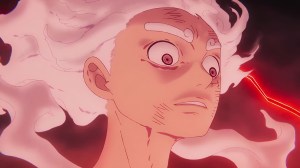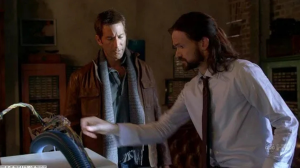When the Halloween season begins to roll around, horror movies earn a surge in popularity among all movie fans, inspiring even those with minimal interest in scary stories to embrace terrifying tales. While there are a number of classic staples in the genre that pay their respects to Halloween specifically, the traditional components of the holiday are lost on many filmmakers. Luckily, writer/director Michael Dougherty delivered audiences Trick ‘r Treat in 2009, an anthology film that used its vignettes to honor the various components of the holiday. For the endeavor, Dougherty enlisted Braveheart and Adaptation star Brian Cox to play Mr. Kreeg.
Videos by ComicBook.com
In the segment, Cox played an old man who hated Halloween, only for a pint-sized visitor to invade his house in search of candy. Kreeg learns this isn’t your average guest, as a series of otherworldly events begin to unfold.
ComicBook.com caught up with Cox to discuss the straight-to-video film’s legacy, the stigmas of the horror genre, and the caveat he made in regards to appearing in the film.

ComicBook.com: One of your more beloved roles in the horror community is as Mr. Kreeg in Trick ‘r Treat, but between that and The Ring, Hammer House of Horror, and being the first actor to play Hannibal Lecter with Manhunter, you have a number of genre accomplishments. Was horror a genre you had a strong connection to before becoming an actor?
Brian Cox: No, quite the opposite. I wasn’t really one for horror films, actually, at all. I used to enjoy the Vincent Prices and the Peter Lorres and the Boris Karloffs, but I wasn’t into Frankenstein, or anything like that. I appreciated them, but I was much more about reality. I was much less about fantasy and more about reality. So it was a strange thing, and it’s a strange inheritance, really, for me, but it’s happened. But I once worked with Peter Cushing years and years ago, who played Baron Von Frankenstein, and he played in many of the Hammer movies, and he hated the word “horror.” I said, “You do all these horror films.” He said, “No, no, they’re not horror, they’re fantasy films. I do fantasy films.” He preferred to call them fantasy films, and I understood that. I know what he meant so perhaps I should go along with him and say, no, as far as I’m concerned they’re fantasy films, not horror films.
And taking advice about the genre from Peter Cushing is a pretty good source.
He was a lovely man, he was divine. I did a thing called the Hammer House of Horror, a TV thing, with him, and it’s quite a classic, and he was great. He was delightful, delightful. And of course, he had a pedigree in the theater and everything. He was a fight arranger as well. He was an extraordinary guy, an extraordinary man.
The horror genre has earned a stigma as not being as sophisticated a genre as many other forms of cinema, and even Peter Cushing preferred to call them “fantasy films.” How do you feel about the reaction in some audiences that a horror film automatically means it will be of poorer quality than any other film?
One of my favorite films is a film which is a sort of horror film. It’s about a woman going through a breakdown. It’s a film called “Cul-de-Sac,” it’s directed by Roman Polanski. It’s a really interesting film. I mean, Rosemary’s Baby, I love Rosemary’s Baby. I think that’s an amazing film. I mean, those kinds of black magic films, I quite like a lot of those.
So I don’t rule them out, and I do enjoy, if I’m sitting here and there’s The Raven going on, or any of Vincent Price’s movies, [like The Abominable] Doctor Phibes, I go, “Yeah, good old Vincent Price.” He’s such a character. So I do enjoy it, but it’s not a metier. It’s not the thing I pursue, but I do like it, yeah.
Trick ‘r Treat is definitely more of a fantasy film, as it incorporates a number of fantastical elements. Did you get involved with the project because you had previously worked with Michael Dougherty on X2: X-Men United?
It really goes back to Bryan Singer and X2, and Michael and his partner at the time [Dan Harris]. There was the two of them. Bryan used to work them very hard, and Michael, clearly, because he had a thing for comic books. I mean, he really liked comic books, and I think he drew as well. And when I knew it was going to be his first film, I was pushed for time.
He said, “Will you do it?” And I had a gap, and I said, “Yeah, I’ll do it.” I said, “I’ll do it, but I’ll tell you what I’ll do.” I said, “I won’t learn it, I will come to the set, and you just tell me what to do, and I’ll do everything you say. Like doing a silent film, you do it, and I won’t argue, I’ll just do it.”
And actually, I found it one of the most liberating experiences I’ve had on film, because Michael, he had a clear vision of what he wanted. And he said, “Can you do this? The guy’s there. Can you look there? And the little creature is there. Can you look there?” He said, “You’re now falling down the stairs.” He said, “And then you look back up the stairs.”
So I did it all. I did it all almost by numbers, but it was very liberating, because I didn’t have any opinions about it, I just did it. The only thing I wanted to do was I wanted to look like the guy who directed The Fog, John Carpenter. I wanted to look like a cross between John Carpenter and Jerry Garcia of The Grateful Dead. I said, “I kind of want that look.” So I got a nose, and I got that look. I met Carpenter once, and it’s based on him. But of course, I’m squarer, and so it was a bit more like Jerry Garcia. But that was the deal, and I said, “That’s the only thing.”
Of course, the makeup people loved it, because I had this nose. So I was very much concerned with the externals of it. And then Michael, the great thing about Michael was his vision. It’s such a great vision, that movie. It’s such an extraordinary movie, and I just said, “I’ll go along with it. Just tell me what to do, and I’ll do it.”
And it was very relaxing. It was very freeing actually to do that.
And saying you’ll do the movie only if you can look like such a beloved director likely just made the experience better for everyone, like you might as well have said you would only do it if you could work for free.
Yeah, Michael went for that idea. He liked that idea. Of course, he’s an homage person. He pays homage to a lot of people like that. I said, “It fits the bill.”
And your decision to honor Carpenter, is that because you personally are a fan of his or just knew he was an important figure in the world of horror?
No, no, I am a fan of John Carpenter’s. I like John, and I met the guy, and I really liked him. He’s a really interesting guy.
You said you had met him before but, out of curiosity’s sake, was it in relation to possibly working with him on a project?
No, it was just a job. I can’t even remember what it was, but I remember there was the chance to meet the famous John Carpenter. And I thought, “Oh, yeah.” And he was a really bright guy, and he was very erudite.
It’s like I worked with Wes Craven as well, and Wes Craven was the same. Wes Craven was this famous horror guy, but he was actually like a university professor. It just didn’t make any sense, I thought he should be doing these very intellectual pieces, but he did this stuff. He was a really, really, really nice man.
Well and with Carpenter being involved with the Halloween franchise again, we’ll put a word in for you to play Michael Myers or something in the new sequels.
Or the Donald Pleasance part.
When Trick ‘r Treat first came out, it didn’t have a major release, as it played festivals and then landed on video. In the last 10 years, the following has grown wide with horror fans, earning marathons every Halloween and being incorporated into Universal Studios’ Halloween Horror Nights. When did you realize that this film had a following and was finally getting embraced by fans?
I thought it was pretty tremendous to start with. I thought it was a great script. I thought it was a unique vision, a unique take on the horror genre, I thought, because it’s quite savage, but it’s also quite blackly funny, and I was surprised.
I’ll be absolutely honest with you, I was surprised it didn’t get a better distribution than it got, because it deserved it, when I think of the schlock that’s out there. And I thought, “Well, this is a class thing.” And of course, they did this thing a couple of years ago, where we had a big showing of it. And what’s the company, is it Legendary?
Legendary were all for it, and there was the go-ahead to do some kind of sequel about it, but I never knew what happened to that.
And Michael seems just as interested for it, even if a film like Godzilla: King of the Monsters is keeping him busy.
Is that what Michael is doing now?
Yeah, he directed this year’s Godzilla sequel.
It’s an absolute classic, Trick ‘r Treat. And I still, somewhere in a cupboard somewhere, I still got the doll, which occasionally scares me as I open up a cupboard and he’s standing there, this creature, the guy who ate the razor blades and the candy and stuff.
*****
Stay tuned for details on the future of the Trick ‘r Treat franchise. Fans can currently enjoy Cox in Season Two of Succession, airing Sunday nights on HBO.








